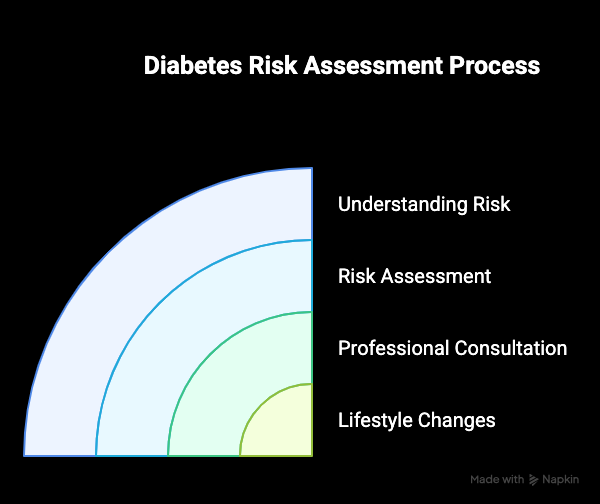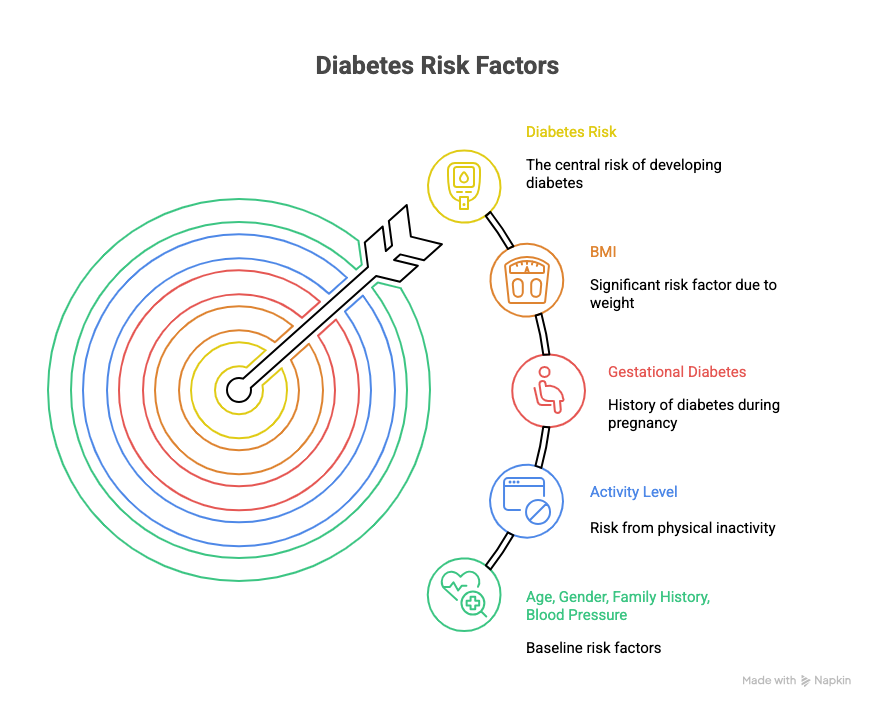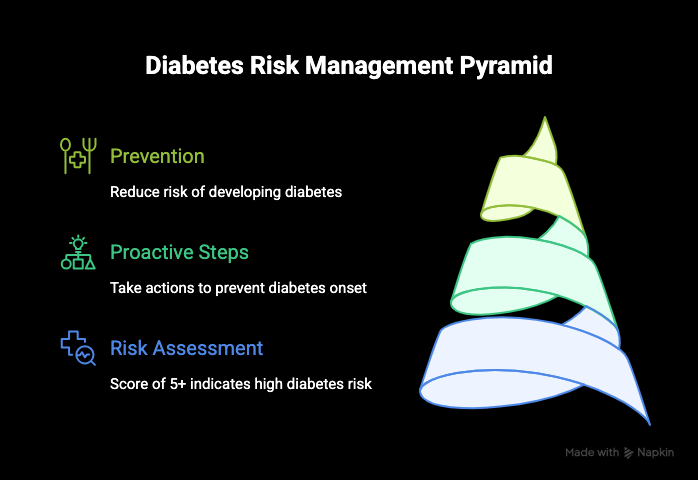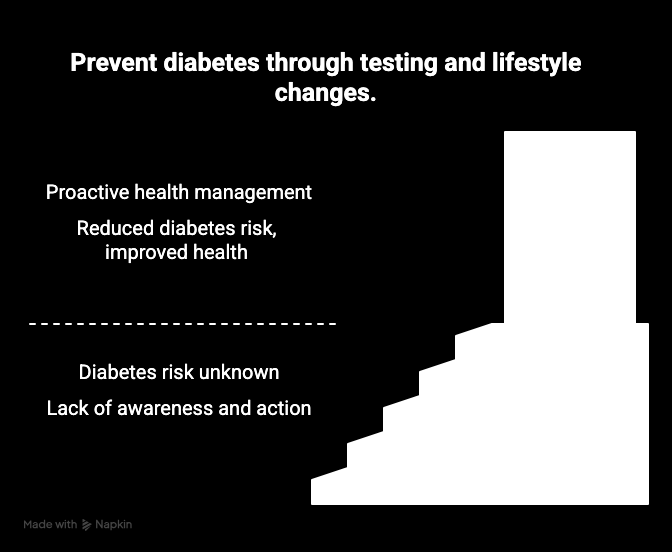Key Highlights
- The American Diabetes Association (ADA) offers a simple risk assessment to help you understand your chances of developing type 2 diabetes.
- This test is a questionnaire, not a blood test, and evaluates factors like age, family history, and weight.
- A high score on the risk test is not a diagnosis but a strong indicator that you should consult a healthcare provider for further testing. While the ADA Diabetes Risk Test is a useful tool for an initial risk assessment, its accuracy is not absolute, and it cannot guarantee whether you will develop type 2 diabetes. Many people with prediabetes show no clear symptoms of diabetes, making this risk assessment a crucial first step.
- Many people with prediabetes show no clear symptoms of diabetes, making this risk assessment a crucial first step.
- Knowing your score empowers you to make necessary lifestyle changes to lower your risk.
- Discussing your results with a professional can help you manage your blood sugar and overall health effectively.

Understand Your Diabetes Risk: Take the ADA Diabetes Risk Test
Understanding your health risks is a crucial step towards maintaining your health and well-being. One important aspect of that is knowing your diabetes risk. Have you ever wondered what your risk might be? The ADA Diabetes Risk Test is a simple screening tool developed by the American Diabetes Association to help individuals identify their likelihood of developing type 2 diabetes based on key risk factors like age, weight, family history, and lifestyle. While there are other diabetes risk assessments available, the ADA Diabetes Risk Test is specifically tailored to widely-accepted risk factors and is endorsed by the American Diabetes Association, which may make it more reliable or recognizable compared to other tools that could use different scoring systems or focus on additional medical data.
Here’s a simplified way to find out: the ADA Diabetes Risk Test. It’s simple, quick, and can make a big difference in your health journey. By answering just seven questions, you can gain insight into your risk level.
What’s Your Risk Score?
The ADA Diabetes Risk Test helps you determine your risk score by looking at several factors:
- Age: If you’re over 40, add one point.
- Gender: Simply being male adds another point.
- Family History: Do you have a family history of diabetes? That’s more points.
- Blood Pressure: High blood pressure is another risk factor.
- Activity Level: Being physically inactive? Add a point.
- Gestational Diabetes: A history of gestational diabetes during pregnancy warrants more points.
- BMI: Being overweight or obese increases your risk score rapidly.
- https://diabetes.org/about-diabetes/diagnosisThe A1C test measures your average blood glucose for the past two to three months. The advantages of being diagnosed this way are that you don’t have to fast or drink anything. Diabetes is diagnosed at an A1C of greater than or equal to 6.5%

What Do Your Scores Mean?
If you score five or more, you are at high risk for diabetes. However, being at high risk doesn’t necessarily mean you have high blood sugar right now. It means you need to take proactive steps towards prevention.

Test, Act, and Prevent
Understanding your risk is just the beginning. It’s crucial to act upon it. Get tested, make lifestyle changes, and prevent diabetes before it starts affecting your health. Knowing your risk could indeed save your life.
Make it a priority to take the ADA Diabetes Risk Test today. A simple test could lead to insights that help you take control of your health.
Stay informed. Stay ahead. Remember, your health is the only superpower you’ve got.
Take the test today by clicking the link in the description.
This message is brought to you by Kundlas MD.

The ADA Diabetes Risk Test emphasizes the importance of monitoring blood glucose levels, as elevated readings can indicate an increased risk for developing type 2 diabetes
ADA Diabetes Risk Test-what is your score
https://doi.org/10.1111/dme.12168
Taking the ADA Diabetes Risk Test can help identify individuals at increased risk for type 2 diabetes and cardiovascular disease, allowing for early intervention and lifestyle changes to improve overall health
https://diabetes.org/about-diabetes/diagnosis
Doctors sometimes refer to prediabetes as impaired glucose tolerance (IGT) or impaired fasting glucose (IFG), depending on what test was used when it was detected. This condition puts you at a higher risk for developing type 2 diabetes and cardiovascular disease.
Frequently Asked Questions
Can children safely take the ADA Diabetes Risk Test?
Yes, but the risk assessment is typically recommended by the American Diabetes Association for children over 10 who are overweight and have other risk factors. It is best to complete this screening for children in consultation with a healthcare provider.
**
How often should the ADA Diabetes Risk Test be repeated?
Health professionals suggest that adults with a normal test result should be retested every three years. If your risk factors change (e.g., weight gain, decreased activity), you might consider retaking this risk assessment sooner to see how your score is affected.
**
What should I do if my score is high but I have no symptoms?
A high score is a significant risk factor, even without symptoms of diabetes. You should schedule an appointment with a healthcare provider to discuss your result and medical history. They will likely recommend a blood test to check your blood sugar levels.
References:
[1] Aldayel, F. A., Belal, M. A., & Alsheikh, A. M. (2021). The Validity of the American Diabetes Association’s Diabetes Risk Test in a Saudi Arabian Population. Cureus, 13(9), e18018. https://www.cureus.com/articles/18018-the-validity-of-the-american-diabetes-associations-diabetes-risk-test-in-a-saudi-arabian-population
[2] National Institute of Diabetes and Digestive and Kidney Diseases. (2022). Diabetes Tests & Diagnosis. https://www.niddk.nih.gov/health-information/diabetes/overview/tests-diagnosis


